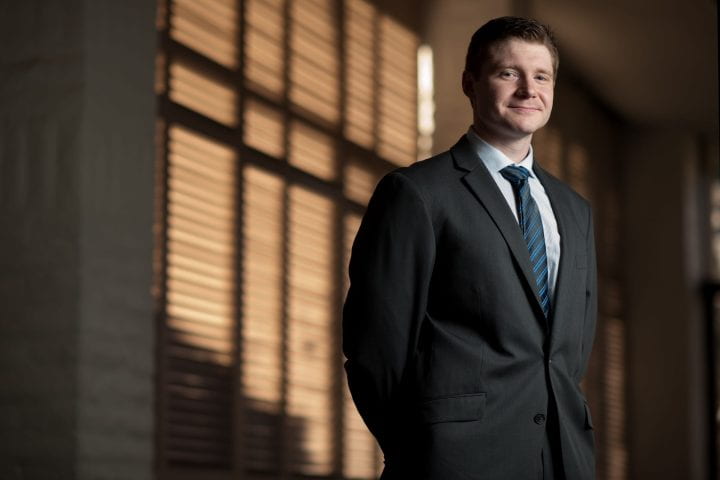Seeking the source of seizures
Grad student Ryan Schutte’s epilepsy research has earned him a Public Impact Fellowship

For most people, flies are a household nuisance. But Ryan Schutte has found a greater purpose for the little buzzers. They’re helping him uncover clues to a severe form of childhood epilepsy.
Schutte, a fifth-year Ph.D. candidate in UC Irvine’s Department of Anatomy & Neurobiology working in the laboratories of Diane O’Dowd and Martin Smith, is using fruit flies to model fever-induced seizures similar to those seen in Dravet syndrome.
The insects have been genetically modified to carry a mutation that causes Dravet syndrome in humans, and they allow Schutte to study how these mutations affect communication among brain cells. In collaboration with postdoctoral fellow Lei Sun, he’s discovered that cell membrane channels key to nerve cell signaling open more slowly and close more quickly in the brains of Dravet flies.
Many children with Dravet syndrome experience not only violent seizures but also poor development of language and motor skills, hyperactivity and difficulty relating to others. Furthermore, Dravet seizures are often not well controlled with classic anti-epileptic drugs. With the new fly model of Dravet seizures, Schutte and Sun are now screening novel compounds to treat this and similar forms of epilepsy.
It’s important work, and Schutte’s research and dedication have earned him a 2012-13 UCI/Stanley Behrens Public Impact Fellowship. This is the fifth year that UC Irvine’s Graduate Division has awarded $10,000 Public Impact Fellowships and the first year that two students meeting specific criteria have each received a $20,000 UCI/Stanley Behrens Public Impact Fellowship.
“Ryan has tremendous potential as a researcher,” says Smith, professor of anatomy & neurobiology. “He’s smart, incredibly hardworking and enthusiastic – a person who sees only good things happening. That’s just the temperament one needs to be a scientist.”
Schutte’s research acumen grew from a family environment that encouraged scientific study. His parents both work in healthcare, and he was drawn to science fairs and courses from a young age. So when Schutte finished high school in 2003 and enrolled at UC Irvine, it wasn’t surprising that he pursued a bachelor’s degree in biological sciences.
“I really like the program here,” he says. “It has a great range of classes and was a great fit for me.”
After graduating in 2007, Schutte moved into UC Irvine’s doctoral program in cellular & molecular biosciences, and he works with the research groups headed by Smith and O’Dowd, professor and chair of developmental & cell biology.
For the past five years, Schutte has been a teaching assistant in O’Dowd’s large freshman biology class, Bio 93, and in 2011 he received an Edward A. Steinhaus Memorial Award, evidence of his outstanding performance.
“Ryan is a fabulous graduate student,” says O’Dowd. “He does a great job balancing his commitment to rigorous research in the lab and the education of our undergraduates in both the classroom and the lab.”
Currently, Schutte is mentoring three undergrads – Jacqueline Algara, Eden Barragan and Neema Hariri – working on the fly project in O’Dowd’s lab.
He’s set to receive his Ph.D. in December, after which he’ll secure a postdoctoral research position, continuing the hard work that leads to tomorrow’s medical breakthroughs.
“People have asked me why I enjoy research, and a big part of it is the possibility that discoveries we make could improve someone’s life in the future,” Schutte says.